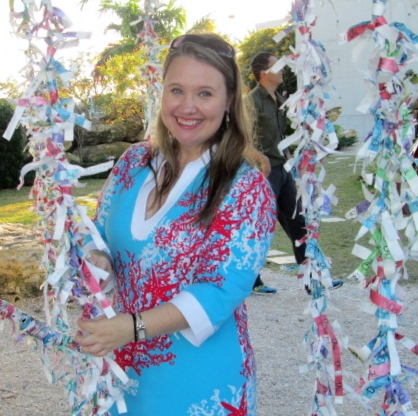Dr. Jennifer Ann Wooten joined the faculty of SPS in Fall of 2015, as our new Director of Language Instruction. She describes her job as “helping us all be the best teachers that we can be so that our students have the best language learning experience possible.” Her current scholarly and pedagogical foci include teaching World Languages for social justice and encouraging community engagement (especially via service-learning courses).

“Helping us all be the best teachers that we can be so that our students have the best language learning experience possible.”
Dr. Wooten understands the challenges of learning and teaching a foreign language. Although she was exposed to Spanish at an early age, she recalls that, “Like a lot of students today, I didn’t have access to instruction in Spanish once I moved into public schools in first grade. I remember saying the alphabet, counting, repeating colors, and singing songs in Spanish to myself and with some of the kids who spoke Spanish throughout elementary school. Even then I recognized that Spanish allowed me another way to talk about things, to communicate with some of my little friends, to move my mouth in other ways, to be different.”
One of the things that Dr. Wooten already loves about UF, and our department in particular, is the emphasis on community engagement through the Gator Good campaign. Her work in her Spanish classes and in her own research has increasingly focused on how university students can collaborate with local organizations serving Spanish speakers to further the goals of those organizations while also increasing students’ linguistic proficiency and their understanding of the experiences of the individuals with whom they work.
When university students move beyond the classroom, they see that Spanish and Portuguese are not “foreign” languages – they are used in numerous ways on campus, in Gainesville, in Alachua County, in our state, and in our nation! Dr. Wooten notes that it is especially “motivational for university students to see the varied contexts where they can use and extend the skills they are learning in the classroom not only for their own purposes but also in service to others.”
In terms of where she would like to take our department, Dr. Wooten would like us to explore what she calls “a sort of inside-outside pedagogy” here. In other words, to consider how we can encourage students to further engage with Spanish- and Portuguese-speakers beyond our classroom walls: How can instructors go beyond, integrating community service and activities into and throughout our curriculum, even at the novice and intermediate levels? Dr. Wooten quickly clarifies, though, that she is not only advocating for a traditional conceptualization of service learning, that takes place outside of the classroom. Showing the breadth and depth of Spanish and Portuguese can happen in myriad ways, from virtual and in-person meet-and-greets and field trips, to professional experiences, to using the language for personal growth (for example via creative writing). These activities are happening in the department, including in the Spanish for the Professions courses and courses for the majors and minors in Spanish and Portuguese, because the faculty in the department are invested in and skilled at connecting students and Spanish and Portuguese in really innovative, vibrant ways.